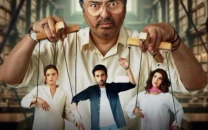Menendez case gets Murphy-fied
'Monsters' review: Real-life horror meets streaming - but at what cost?

Back in the '90s, major networks were tripping over themselves to churn out quick-turnaround TV movies based on real-life crimes, hoping to capitalise on the public's fascination with scandalous headlines. Fast forward to today, and that impulse has evolved. Streaming services like Netflix now serve up polished mini-series that dig deep into the same sensational stories, giving them a veneer of prestige. Monsters: The Lyle and Erik Menendez Story is the latest addition to this trend, with Ryan Murphy once again at the helm. Murphy has mastered how to spin these tales into the ultimate weekend binge whose clips end up circling your For You Page until you finally give in and watch. He did it with Dahmer, turning it into a TikTok sensation, complete with young women fantasising about a murderer with Evan Peters' face. Now he's turned his attention to the Menendez brothers' case, and it's clear he's employing the same bag of tricks.
Over the span of nine episodes, Monsters delves into the sordid history of Erik (Cooper Koch) and Lyle Menendez (Alexander Chavez), who were convicted of murdering their parents, José (Javier Bardem) and Kitty (Chloe Sevigny), in 1989. The series toggles between the days leading up to the killings, flashbacks of family dysfunction, and the brothers' eventual trial. Murphy, predictably, aims to give the audience all the juicy gossip and gruesome details they crave, before blindsiding them with unsettling moments of ambiguity. Were the brothers truly victims of horrific abuse, or were they simply sociopathic connivers?
A tale of truth ambiguity
There is one standout moment in the series, a rule-breaking fifth episode that zooms in on a single shot 35-minute conversation between Erik and his lawyer. In this episode, Erik recounts the abuse he claims both brothers endured at the hands of their parents, and the camera slowly pushes in on him as the tension builds. It's a masterclass in filmmaking, which ends in Koch delivering an extremely detailed monologue that feels painfully intimate. Unfortunately, the show doesn't sustain this momentum, quickly reverting to its usual chaos as soon as the credits roll.
The show's narrative zigzags back and forth, further confusing the audience about how much of the brothers' story is to be believed. Are these two broken boys who lashed out after years of trauma, or are they cold-blooded killers, masterminding a way to inherit their parents' wealth? At times, the series succeeds in casting doubt, particularly when Vanity Fair journalist Dominick Dunne (played by Nathan Lane) raises the question: "Either those boys endured the most sickening abuse imaginable, and their parents got exactly what was coming. Or you were able to coach that performance out of a lying murderous psychopath. I don't know which of these possibilities scares me more." Dunne serves as the series' Greek chorus, voicing suspicions about the brothers' true motivations, but his character ultimately feels like a vehicle for the audience's uncertainty rather than a fully realised individual.
Tragedy for thrills
At its core, Monsters raises a crucial ethical question: Should we really be exploiting these real-life tragedies for entertainment, especially when the legal battles surrounding them are still unfolding? There's something inherently unsettling about turning a story of alleged abuse and murder into bingeable content. Murphy's take on the Menendez case highlights the blurred lines between victim and perpetrator, but the show never quite nails the delicate balance needed to explore such a nuanced topic. It's all shock value and moral ambiguity, with little genuine insight into the real human suffering.
One area where Monsters really drops the ball is in its handling of male sexual abuse, a topic still rarely discussed with the same gravity as its female counterpart. The show had an opportunity to dive deep into this issue, but instead, it skims the surface, offering little more than fleeting references to the brothers' alleged trauma. In later episodes, it even seems to suggest a strange sympathy for José, particularly in a tender scene between him and Kitty. It's moments like these that make it clear Murphy had no intention of handling the subject with the care it deserved, preferring instead to lean into his well-worn trope of romanticising abusers and murderers.
And then, there's the series' most baffling decision: the inclusion of an incestuous relationship between the brothers. A relationship they have vehemently denied in court, and which has never been corroborated by any credible source. This added layer of sensationalism feels cheap and entirely unnecessary, only serving to further distance the show from any semblance of an intellectual or responsible retelling of the facts.
The great divide
Despite its flaws, Monsters has succeeded in reigniting public interest in the Menendez case. While some viewers have praised the performancesespecially Oscar winner Bardem's chilling portrayal of José, who has been identified by some psychiatrists for playing the most convincing psychopath on screenothers, including the Menendez family, have been less than thrilled. In fact, Koch admitted in an interview with Variety that the negative reactions "definitely affected" him, though he still felt empathy for Erik.
The case is far from closed, with new evidence regarding José's alleged sexual abuse coming to light. Erik and Lyle are scheduled for a new hearing this November confirmed by Los Angeles District Attorney George Gasxon, and they've even garnered support from high-profile figures like Kim Kardashian. In a personal essay for NBC News, Kardashian expressed hope that the brothers' life sentences might be reconsidered, pointing out discrepancies in their second trial where key evidence of abuse was excluded. Whether the series will influence this new chapter in the brothers' legal saga remains to be seen, but it's clear that Monsters is less about revealing the truth and more about feeding our collective hunger for the macabre.



















COMMENTS
Comments are moderated and generally will be posted if they are on-topic and not abusive.
For more information, please see our Comments FAQ